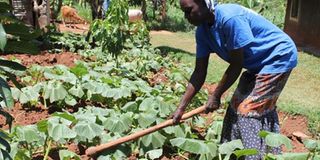Healthy benefits from vegetables

Josephine Nyanweso of Ebukhaya village in Vihiga county on her farm weeding her indigenous vegetables that she planted using organic fertilizer . PHOTO | ISAAC WALE |
What you need to know:
- The farm sits in the middle of a swampy area, thus water is not a problem. He pumps the water to his farm using a generator he recently bought from his profit at Sh25,000.
- In Kakamega County, farmers Joshua and Josephine Oyamo are also earning a living from growing traditional vegetables. The two grow amaranth (libokoyi), sagaa and pumpkin, among others.
On the three-acre farm in Thika municipality, Collard greens (sukuma wiki), capsicum, pumpkins, tomato, spinach and traditional vegetables compete for space.
Sukuma wiki, however, occupies the biggest section of Peter Wainaina’s farm, who is among farmers in the country reaping big rewards from vegetables.
Seeds of Gold meets Wainaina, 40, at his farm harvesting the plants.
“I have an order to deliver today. I am supplying two bags to an institution in Thika Town,” says Wainaina as he picks sukuma wiki leaves from one crop to another. However, as he seeks to supply sukuma wiki, he is working on another order for traditional vegetables.
The traditional vegetables he grows are managu (common night shade), Jews Mallow (mrenda) and kunde (cowpeas). He plants seeds of the vegetables in a nursery first before transplanting them.
“I earn Sh10,000 a week from the 340kg of vegetables I harvest. I sell the vegetables in 30kg sacks, each going for Sh750.” The farmer saved Sh80,000 from his previous job – mechanic - to start the venture seven years ago.
“I used the money to lease a three-acre piece of land that was swampy in Kiang’ombe village, Thika and bought seeds. I rehabilitated the farm by digging trenches on the portion I wanted to plough to drain water. I then sub-divided it and planted my crops.”
The farm sits in the middle of a swampy area, thus water is not a problem. He pumps the water to his farm using a generator he recently bought from his profit at Sh25,000.
“I have planted the crops on one-and--half-acres. I am now tilling the other for watermelons, cucumber, courgettes and butternuts, which mature faster and have high demand.” The farmer does not sell his vegetables in retail as he is one of the chief suppliers in Githurai, Thika, Juja, Ruiru and Makongeni markets.
KAKAMEGA COUNTY
In Kakamega County, farmers Joshua and Josephine Oyamo are also earning a living from growing traditional vegetables. The two grow amaranth (libokoyi), sagaa and pumpkin, among others.
“Clients place orders at different times. My husband ensures that he delivers,” says Josephine. Joshua spends time with his wife tending to their vegetables, which they sell to residents and schools.
Their records show that they are making an average of Sh20,000 every month. A kilo of vegetables is sold between Sh30 and Sh50 depending on the variety.
Through the venture, they have been able to pay school fees for their two children in high school.
Vegetables, unlike maize and sugarcane, are less labour intensive. They mature early, and depending on the variety, they are resistant to dry spells, notes Rural Information and Agriculture Development Centre director Simon Wesechere.
Mary Wambugu, an agricultural extension officer and Stephen Njeru, a Horticultural Crop Development Authority officer say vegetables need regular spraying.
“They also need enough manure, moderate watering and good space for better growth,” Njeru says.
Among the challenges traditional vegetable farmers face is the high cost of farm inputs such as fertiliser and seeds.




